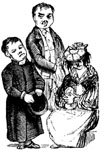
The Decline of the Family in 20th Century America
FROM A PRODUCTION UNION TO A CONSUMER UNIT
In the history of the world, 100 years is a short period, but within the past 100 years, changes — notably the mass migration from farm to city — have been so great as to make our century one of the most significant in history. Before 1900 more than 90 percent of the U.S. population lived on farms, subsistence farms; 10 percent or less lived in cities. Today the figures have been reversed, with less than 3 percent still living on farms, and even many of these people have adopted the city way of life.
In those earlier times, life on the farm was the standard of life for Americans. The farmstead produced pretty much everything the family needed to live. Although in 1900 spinning and weaving were out of date by a half century, still most of the food was produced on the farm, from the garden, orchard, chickens, pigs, and milk cows. Cloth was purchased, but clothing was made at home. Corn or wheat grown on the farm was taken to the mill, and for a percentage of the grain it was ground into corn meal or wheat flour. Cellars kept the vegetables and apples during much of the winter; there was drying and, by 1900, canning. The fresh milk produced cream and butter, with the skim milk going to cottage cheese or to fatten the pigs. Table scraps went to the chickens or family pets. Eggs were plentiful most of the year, and a good housewife knew how to manage her sitting hens to raise a good crop of chickens each spring and summer. Geese were often kept to provide not only meat, but also feathers for pillows and feather beds, one of the best protections from cold winter nights. Washing clothes was a major chore: heating water on the wood stoves, scrubbing out dirt on washboards, wringing out the clothes by hand, hanging them outside to dry in summer or inside in winter. Soap was made at home, too, from leftover fats, and with lye leached out of the wood ashes from the stove. Baking bread was a fine art. The rural home was a busy place, the productive center of society. There was lots of work involved, hard work and skill, but it was satisfying.
Without a good housewife, a farmer could not make it. The family was a productive team. It took careful management to raise livestock and much of the work had to be done by hand. The farmer raised his horses, cows, sheep, pigs, and other animals, doctoring them when necessary. He had to be a blacksmith of sorts; he built his own buildings and repaired machinery. He gathered and cut firewood, built fences, first with rails which he split himself, and later, when barbed wire was available, by cutting and setting the posts and then stretching the wire. Then there was the ploughing, cultivating, and harvesting of crops.
It is often overlooked that the subsistence farm was also a trade school. A normal lad of 16 could take over a farm and successfully operate it. From earliest years he had been trained in all aspects of the work. Chores started at four or five years, and were increased as he grew and could handle them. It was the same for girls, who at 16 could manage a farm household. Widows could keep a family together with a little farm, raising a garden, chickens, a few pigs, and a milk cow — probably better than a widower could carry on alone.
You May Also Enjoy
For the sake of your own immortal soul, and for the sake of the lives of the unborn children your ideology menaces, please rid yourself of this delusion.
Just as Jesus’ command to love one another cannot be seen as a part-time obligation, so too His call to peacemaking is unconditional, unlimited, and uncompromising.
Here we present samples of offerings in the Narthex, the NOR’s online blog.

